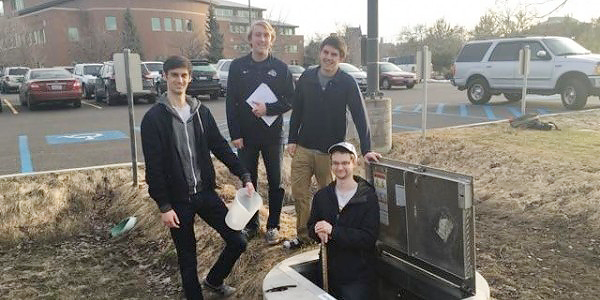Look around at anything built or retrofitted since the mid-1980s in Spokane County, the City of Spokane or Spokane Valley and you will likely see storm water swales, or bio-infiltration ponds. These low, marshy bits of land slow and capture runoff from roads and parking lots, filtering pollutants and other elements that would otherwise end up in storm drains. Effectiveness studies on these swales are required to maintain permits with the Department of Ecology, which is where Gonzaga civil engineering students Matt Winterle (’16), Connor Trimble (’16), Kevin Krzyzewski (’16), and Jason Neibergs (’16) come in.
This project began three years ago, when Matt Zarecor, principal engineer with Spokane County, who had been serving as a liaison on the design advisory board for just over a year, approached Gonzaga engineering adjunct instructor Aimee Navickis-Brasch about turning the effectiveness study into a senior engineering project. Zarecor and Navickis-Brasch began a project that has provided learning experiences for three years of student teams and valuable data for Spokane County. Teams of Gonzaga engineering students have developed criteria for site selection, designed and constructed a bio-infiltration pond behind McCarthey Athletic Center and a monitoring system, and are performing tests to determine the best type and thickness of treatment media.
“The first rainfall simulation was definitely memorable,” recalled Winterle. “I had to spray a firehose across the parking lot (I got soaked, by the way) before we took samples from tubes flowing from the ponds into the ground, all while being watched by professional engineers from the Spokane area. It was so rewarding to receive advice from these professionals about how we can best approach our project.”
“We saw it as an ongoing project,” said Zarecor, “and having the fresh perspectives of the students each year has been a great experience.” While each new team of students brings a unique view and sense of enthusiasm, they also build on the progress made by those who worked on it in years past.
“There were some challenges we faced with the equipment,” said Neibergs, “and we had to reach out to the people who worked on it previously.” Since the project is expected to continue beyond Neibergs, Trimble, Krzyzewski and Winterle’s work, the team must also consider how their work will be carried forward by future Gonzaga engineering students. Having to “pass the torch” with their project gives these students experience consistent with what they may expect as engineering professionals.
“So long as we are getting good information and the students are learning, the process will continue,” said Zarecor. “I would encourage other organizations to work with the University. It’s been a fantastic experience for us and the students get a valuable learning opportunity.”
If you would like to discuss the possibility of working with a Gonzaga School of Engineering and Applied Science senior capstone project team please contact Toni Boggan at boggan@gonzaga.edu or 509-313-3913.
